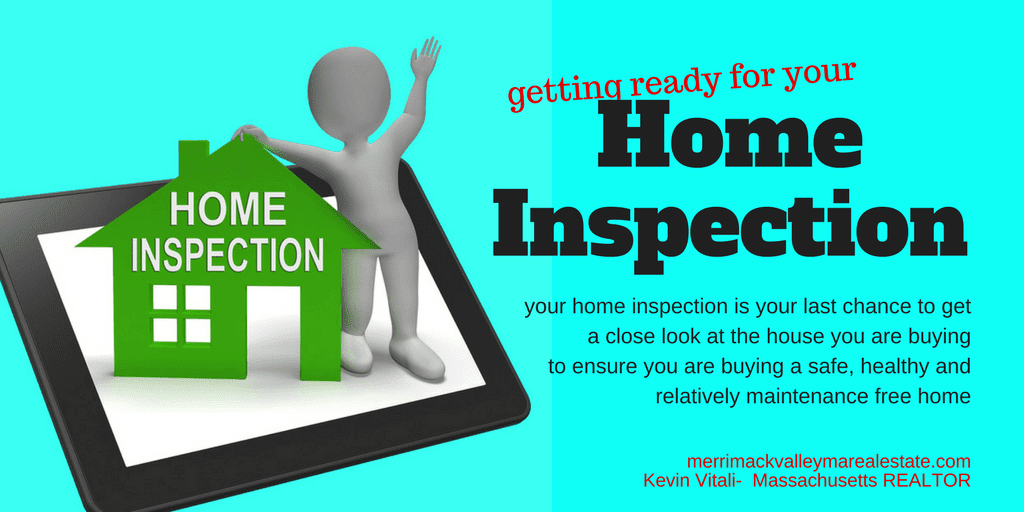

You have put an offer in on a home that was accepted!! Congratulations. There is probably no doubt you decided you should have a home inspection on your new home before closing. Today we will talk about how to get ready for your home inspection.
Your home inspection is your last line of defense in insuring your home is safe and sound when you move in as well as alerting you to any repairs they may need to be done immediately or in the near future.
I won’t go into depth here but hopefully you have hired a great home inspector. It will behoove you to know that maybe your buyer’s agent has a great home inspector or you have done your research before finding the perfect home. Now is not the time to price shop. Get the best home inspector you can find.
Getting Ready for Your Home Inspection
Scheduling Your Inspection
Like I said before hopefully you already know which home inspector you are going to use. The minute you get your home under contract, take a minute and review your home inspection contingency.
Make sure you understand the terms and the deadlines that need to be met. Missing a deadline could cost you your good faith deposit if you decide not to buy the house because of home inspection issues.
A typical home inspection period will be 5-10 days. Scheduling early will allow you time to do additional research or bring in other professionals to inspect or give a quote for repairs. Time is of the essence.
Write Down Areas of Concern and Questions
As you went thru the home were there any areas of concern? Write them down so you can call them out to the home inspector. Often when I am working with a buyer and there deficiencies I spotted and they are using one of my trusted inspectors, I discuss with the inspector my concerns ahead of time.
Hopefully you reviewed the Sellers Statement of Property Condition prior to submitting an offer, but whether you did or not this is a good time to see if the seller’s disclosure raises any concerns for you.
Have your concerns and questions ready the day of the inspection.
Understand What a Home Inspection Is and Is Not
Go into your home inspection understanding what it is and is not.
A general home inspection is an overview of structures and systems in a home as it relates to your safety and health as well as the overall condition and repair. A home inspector may call out issues that may require immediate attention as well as issues that are a little more intermediate term.
A home inspector cannot tell you what it will cost to repair something or whether you should buy the house or not. That is a discussion to be had between you and your buyers agent. Ultimately it is your decision as a home buyer.
A home inspection is an overview it is not a test. A home inspection is not pass or fail.
Also note, a home inspector can only comment and make recommendations on what they can see. A home inspector will often remind you of that. The inspection will also be comprehensive and list every little issue that they can find, don’t get overwhelmed.
A home inspectors job is to give you the best overview they can of a house as it sits today as well as what may be expected in the very near future. They will also cover some basic ongoing maintenance and maybe upgrades you should consider.
Do not put an offer in an a home thinking you can renegotiate after the home inspection. The home inspection is not for you to renegotiate. With that said, often a home inspection will trigger renegotiation based on deficiencies you may not have expected in a home. But in no way should you go into the inspection automatically thinking you will renegotiate.


What You Should Expect Out of a Home
What you expect out of a home can certainly vary from price range to local real estate conditions. For example your expectations should be much higher out of a new home than something that was built 40 years ago. Hopefully you will have seen enough homes to get a general sense of a basic condition of the home in your range.
Remember you are buying a used house. It is just like buying a used car. You can expect some dings dents and minor repairs.
But at a minimum you should expect the home to be safe, healthy and all systems and structures working properly unless otherwise disclosed or marketed in the listing.
Safe- An electrical panel corroded from water penetration is a major fire hazard. A bathroom missing a GFCI outlet is is not a major safety issue and can be easily corrected for short money.
Health- Black mold covering half of the roof sheathing or high levels of radon are a major health issue. A small patch of mold on some sheet rock in the basement from a failed water heater is not a major health issue.
Systems/ Structural- A furnace with a cracked heat exchanger is a major systems issue as well as safety issue. A furnace that is working properly but is deemed to be past its serviceable life is not a major systems issue.
At a bare minimum I tell my client we expect a home to be safe, healthy and in proper working order. Past that you really need to speak with your buyer’s agent about what should be expected. There are just too many variables to cover here.
The point of a home inspection is to discover major or costly defects with a home that you did not see when viewing the home.
Two Phrases A Home Inspector Will Use That Drive Home Buyers Crazy
There are two phrases that home inspectors use that can drive home buyers insane thinking the sky is going to come crashing down. I am going to call them out here:
“It is not to code” A home inspector will call out items that may not be to today’s building code. But to be honest, a house shortly after it is built is not to code. You can’t expect a house built in the 1940’s to meet current codes today.
“It is past it’s useful/serviceable life” You will hear this often when inspectors talk about furnaces, water heaters or anything with a projected life span. A HVAC “useful life” is typically 15-25 years depending on the system. Just because it is past it’s useful does not mean it will not last for many years to come. The question is…. is it working properly right now?
Neither of these are generally a cause for great concern. Put these two phrase into context before arriving at your inspection and it will make the inspection easier.
The Home Inspection Itself
Discuss with your agent and inspector how long the inspection will take. Clear your schedule so you can be present and focused. Turn off your cell phone and maybe it is a good time to get a babysitter for the kids.
Also dress appropriately for the weather and dress to get a little dirty. You may be poking your head into some dirty areas like an attic or crawl space. Bring a flashlight and a small notepad.
Before you start, this is a good time to address specific concerns with your home inspector so he has them in the back of his mind as you go thru the home.
Now its time to follow him around. Pay attention and don’t be afraid to ask any questions. Your agent should also be present and focused as well. Often I will ask questions when I am representing a buyer that maybe the buyer should have asked.
The inspector will provide you with a full report within 24 hours of the inspection but it may be a good idea to take notes. A good home inspector will also give you plenty of maintenance tips that is helpful especially if you never owned a house before.
3 Great Questions to Ask During Your Home Inspection
Most home inspectors are very matter of fact. The deliver major issues in the same manner as minor ones. Their job is about stating facts. Here are some great questions to ask to really get to the bottom of things:
How bad is it, really? Just because a home inspector points something out doesn’t mean its a major issue. For example an older home that has settled might have a slight slope in the floor. That is just settlement issues that come with an older home. It’s not bad it is just a flaw in many older homes.
Is this a typical problem you see in homes like this? This is another great question to ask to get to the bottom of the seriousness of an issue. Just like the sloping floor in the example above his answer will be almost all homes of this age will have some settlement.
Who would I get to fix that? Another great question to get perspective on an issue. Often an inspector will look at you and say, I don’t know why you would hire anyone I would just pick up a so and so and pop it in… If it is a larger issue he will tell you the appropriate professional that is needed.
At The End Of the Inspection
Time for a quick recap. A home inspector can’t tell you what to ask for in seller repairs or whether you should buy a home or not, but, again if you pose a question a certain way you can certainly get some great insight. So as your are recapping the home inspections ask the inspector:
If this was your house what issues would you be concerned with that needs to be corrected immediately?
Short term are there any other repairs you would consider and when?
These two questions alone will reveal the importance and priority of the issues in a home. The home inspector may say nothing needs to be done immediately and I would just monitor and pay attention to these areas. This will be an indicator that there really isn’t any serious issues.
If he does call out some issues as major concerns that may be the time to talk to your agent and see if the seller will give a concession or repair the issues.
After You Get Your Home Inspection Report
You will have already gone thru the inspection in your head. But, go thru the report carefully to see if you forgot anything. As you go thru the report create a list of areas of major concern to you and a list of short term items you know needs to be done but you will be willing to take on.
When you put your list together think is this a major safety, health or system/structural issue? If it is a yes, than put it on your list of major home inspection concerns. If the item is something that is under $50-100 to repair I would just put it on your repair list to do yourself.
But other repairs you weren’t counting on can be way more costly like replacing 15 feet of sill from insect damage or mold mitigation in the attic. Both of which could run into the thousands.
Ask your buyer’s agent what if any issues they believe you should have addressed by the home seller. Hopefully your agent is experienced and have a sense of what a seller may consider repairing or compensating you for.
At this point you may want to either pull in a more specialized inspector to review an issue or gets some quotes for larger repairs so you can make an informed decision.
The more informed you are about an issue the better you can resolve it or have the ammo to get a seller to compensate you or repair for you.
Let the Rubber Hit The Road
After you have done all of this it is time to decide with your buyer’s agent:
are we moving forward with the house as-is?
are we asking the seller for repairs or concessions?
are we walking or maybe even running from this home?
Again the variables of what concessions or repairs you should ask for is too great to write about. Discuss that with your agent. You need to take into account whether you are in a buyers or seller market as well as what to expect for the price range you are in for the given area.
Obviously a buyer’s market you can ask for the moon but in a seller’s market you need to be more careful, you could just lose a house over something quite minor.
Final Thoughts on How to Get Ready for Your Home Inspection
You have too much at stake when buying a home. Your last line of defense in buying a relatively problem free home is your home inspection. Get the best home inspector you can find. This is certainly not the time to price shop. the $400-700 spent could save you years of aggravation or tens of thousands of dollars.
Being prepared for you home inspection will allow you to make the most of the inspection and the home you are about to purchase.
Other Home Inspection Resources:
- Bill Gassett Home Repair Request A Home Buyer Should Not Make
- Paul Sian Top Issues Found in a Buyer’s Inspection
- Maria Mastorlonardo Why do a Home Inspection
- American Society of Home Inspectors Find a Local Home Inspector
- Anita Clark Negotiating Repair Requests
What Can I do to Help Buy A House?
Get Ready For Your Home Inspection is provided by Kevin Vitali of EXIT Group One Real Estate of Tewksbury MA. If you would like to sell your home give me a call at 978-360-0422 and let’s get the process started.
Real Estate Services in the following areas: Northeast Massachusetts, Merrimack Valley, North Shore and Metrowest. Including the following communities and the surrounding area- Amesbury, Andover, Billerica, Burlington, Chelmsford, Dracut, Groveland, Haverhill, Lowell, Melrose, Merrimac, Methuen, Middleton, North Andover, North Reading, Reading, Stoneham, Tewksbury, Tyngsborough, Wakefield, Wilmington, Westford




